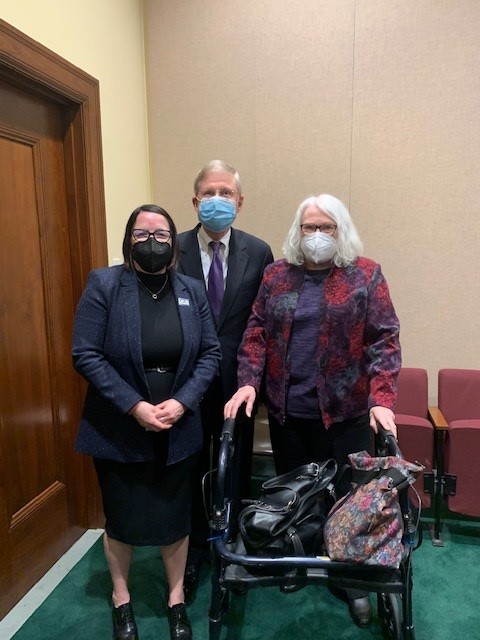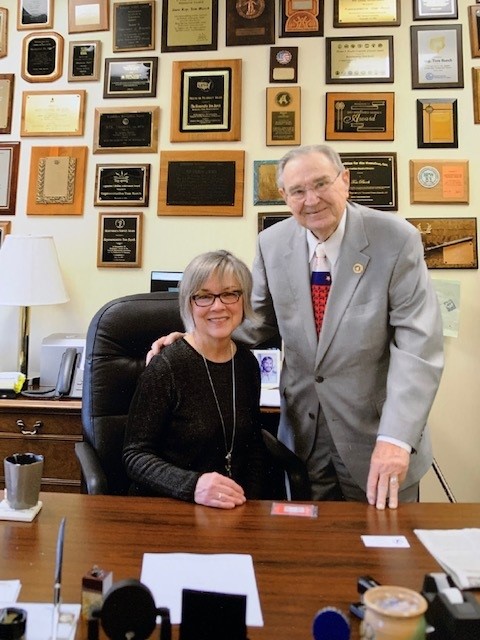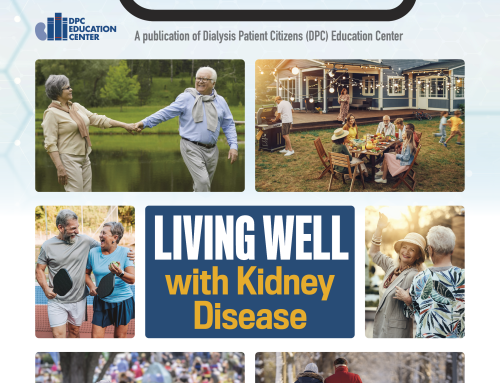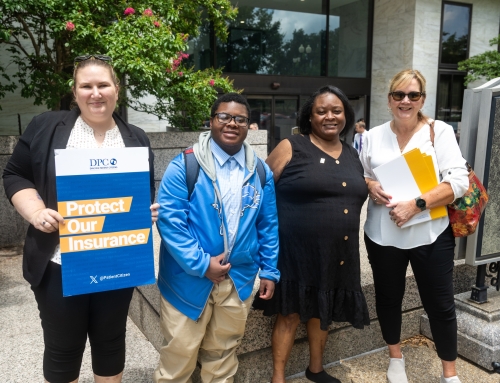Image: Medigap champion Kentucky State Rep. Tom Burch and Elizabeth Lively, DPC Eastern Region Advocacy Director
By Kelly Goss, J.D., LL.M., Western Region Advocacy Director and Elizabeth Lively, Eastern Region Advocacy Director, Dialysis Patient Citizens (DPC)
It’s been a busy start in 2022 for DPC’s state advocacy efforts. Many states are holding shorter legislative sessions due to the upcoming primary elections, and several bills impacting dialysis patients have been introduced and are moving quickly through the legislative process.
Legislation to expand Medigap access has been introduced in Arizona, Kentucky, Louisiana, Maryland, Nebraska, New Jersey, Rhode Island, Vermont, and Wisconsin. Improving access to affordable Medicare Supplement (Medigap) plans is a top policy priority for DPC, and we are pleased that multiple states are considering how they can help patients achieve greater financial security and achieve access to kidney transplantation, particularly in states that have limited or no access to Medigap for the under-age 65 ESRD population.

Those testifying in favor of LB 1190 included Kelly Goss, DPC Western Region Advocacy Director, as well as local activists Steve and Jean Kay of North Platte (Courtesy of Sara Kay)
Kentucky, Nebraska, and Rhode Island legislatures have already held committee hearings on Medigap expansion
bills that would require insurers to allow Medicare enrollees under-age 65 the same access to Medigap plans offered to those age 65 and older. In addition to building strong support among an array of advocacy groups, actuarial premium rate research DPC commissioned shows only a small increase in the overall Medigap premium pool when adding access for under-age 65 ESRD patients. This important data has strongly supported our efforts to educate legislators and gain their support.
In Nebraska, there was broad support for Senator Steve Lathrop’s bill (LB 1190) at the hearing from numerous patient advocacy organizations, healthcare professionals and patients to require greater access to affordable Medigap coverage for Medicare-eligible disability and ESRD patients under age 65. Committee members, including Chair Matt Williams, expressed their commitment to working with interested parties to craft a bill that can be passed next year. A post-hearing article in the Nebraska Examiner articulates the severity of the problem that patients under age 65 and their families experience because they are not able to access Medicare supplemental insurance.
In Rhode Island, a similar bill (H7244) sponsored by Representative Brian Patrick Kennedy was unanimously approved by the House Committee on Health & Human Services and reported for passage to the House floor. The bill is supported by numerous legislators, the Rhode Island Health Insurance Commissioner, and the Rhode Island Governor’s Commission on Disability, among others.
A recent House Health & Family Services Committee hearing in Kentucky on HB 430 also received a lot of support from patient advocacy groups. The bill achieved unanimous approval to move out of committee while continuing to work on bill language with the insurers and is now being considered by the House Banking & Insurance Committee. Sponsored by Chair Kimberly Poore Moser, this legislation has strong bipartisan support, including legislative champions Representatives Burch and Willner.
In addition to Medigap legislation, several states have introduced bills to enhance living donor protections through anti-discrimination measures and financial incentives, such as tax credits or reimbursement costs, that will help increase the number of kidneys available for transplant. Bills are being considered by state legislators in California, Delaware, Florida, Georgia, Illinois, Indiana, Kentucky, Massachusetts, Michigan, Ohio, Nebraska, New Jersey, New York, North and South Carolina, Virginia, and West Virginia.
How can you help? We are always looking for DPC Patient Ambassadors to share their stories by writing letters to legislators, testifying at committee hearings, and participating in advocacy meetings and email Action Alerts that are sent to legislators encouraging them to support legislation. A big shout out to DPC Patient Ambassadors Michael Peoples (Colorado), James “Hap” O. Strunk (Kentucky), Tangela Robinson (Georgia), Jim Myers (Indiana), Angela Gaskell (North Carolina), Gwendolyn Snell (Ohio), Gene Blankenship (Oklahoma), Theodore Chaplin (Rhode Island) and DPC Board Members Maria Robinson (Maryland) and Vanessa Evans (Massachusetts) for their efforts with policy makers or sharing their stories in letters of support for legislation that will help improve the lives of dialysis patients.
Building strong relationships with policy makers through the legislative process is how DPC can achieve success for its members. DPC members play a crucial role in educating policy makers and elevating the patient voice. To learn more about how you can help DPC’s state advocacy program, visit DPC’s website to find your state’s Medigap status and to Get Involved with DPC.
References:
- Nebraska Examiner article: https://nebraskaexaminer.com/2022/02/28/couple-urges-closing-gap-in-medicare-coverage-for-the-disabled/
- Find you state’s Medigap status: https://www.dialysispatients.org/medigap
- Get Involved with DPC: https://www.dialysispatients.org/get-involved/




